Lab to Algorithm: AI's Role in Minimising Animal Testing

In the realm of scientific research, a thought-provoking hypothesis has emerged: Can artificial intelligence (AI) replace animal testing? This blog post delves into this compelling question, exploring the potential advantages, limitations, and ethical considerations surrounding it. As we navigate through the complex landscape of animal testing and the remarkable capabilities of AI, we uncover exciting possibilities for more accurate and humane scientific advancements.
The Current State of Animal Testing
Animal testing has been a longstanding practice in scientific research, serving as a crucial tool for understanding the effects of substances on living organisms. However, it is not without controversy.
Animal testing traces its roots back centuries, with the earliest documented cases dating back to ancient Greece. However, the modern use of animals in scientific experiments gained momentum in the 20th century. Today, animal testing is prevalent in various industries, namely pharmaceuticals, cosmetics, and biomedical research, as a tool to evaluate the safety, efficacy, and toxicity of products and advance scientific knowledge.
Despite that, concerns about the ethical treatment of animals and the moral considerations surrounding their use have ignited impassioned discussions among animal rights activists, bioethicists, and the wider public.
While animal testing has been useful in the past, it also has its drawbacks and limitations. One major concern is the extrapolation of results from animal models to humans. Differences in anatomy, physiology, and genetic makeup between species can lead to unreliable predictions of human responses.
Organ size, structure, and cellular composition and also, differences in hormone regulation, immune responses, and cellular signalling pathways can significantly impact the effects of substances. This can result in disparate biological responses, further undermining the reliability of animal models as predictors of human responses. Regarding genetic differences, the variations in the expression and activity of enzymes, receptors, and other molecular targets can influence the interaction of substances within the body.
Besides these fundamental differences, animals used in laboratory settings undergo various stressors during routine procedures, including handling, restraint, and dose administration methods such as orogastric gavaging. These stressors can have unpredictable effects on physiological, hormonal, immune, cognitive, and behavioural aspects of the animals. This can impact the progression of diseases, responses to chemicals and pharmaceuticals, and the accuracy of scientific outcomes.
For example, the translation of pre-clinical animal models of human neurological diseases into effective treatments has been limited. Despite numerous reports of over 1,000 treatments for multiple sclerosis showing efficacy in animal models, only a small fraction of these treatments have successfully made it to the market after initial development in disease-related animal models.
To overcome these limitations, alternative approaches such as the use of AI models that simulate human biology more accurately are being explored.
In vitro assays, which use cell cultures or tissues, offer a way to study specific biological processes and toxicity without the use of animals. Microfluidic systems, known as organs-on-chips, simulate the functions of human organs and allow for more accurate predictions of drug efficacy and toxicity. Computational modelling, including the use of artificial intelligence, has emerged as a promising approach to simulate human biology and predict the effects of substances.
The 3Rs campaign is a fundamental principle in the context of animal testing. It is an ethical framework that promotes the reduction, refinement, and replacement of animal use in scientific research. The 3Rs stand for:
- Reduction - to minimise the number of animals used in experiments.
- Refinement - focuses on improving animal welfare and minimising any potential pain, distress, or suffering experienced by animals used in research.
- Replacement - encourages the exploration and implementation of alternative methods that can entirely replace the need for animal testing.
The 3Rs principles drive the quest for more humane and scientifically advanced research practices by minimising, refining, and ultimately replacing the use of animals in experiments. AI models play a vital role in this endeavour, offering alternative methods that reduce reliance on animal testing.
The Role of Artificial Intelligence in Scientific Advancements
Artificial intelligence (AI) has already made significant advancements in various fields:
- Image recognition algorithms can accurately identify objects and faces in images, revolutionising fields like computer vision and surveillance.
- Natural language processing allows machines to understand and respond to human language, powering virtual assistants and language translation systems.
- Data analysis with AI techniques enables the extraction of meaningful insights from massive datasets, enhancing decision-making processes and driving innovation in industries such as finance, healthcare, and marketing.
AI holds great potential in simulating human biology
By training AI models on comprehensive datasets of human anatomy, physiology, and molecular interactions, researchers can develop computational models that replicate the behaviour of organs, tissues, and biological systems. These virtual models provide a more accurate representation of human responses to substances, allowing for better predictions of toxicity, efficacy, and other relevant endpoints.
These models excel in making predictions based on patterns identified in large and diverse datasets, integrating multiple factors. In the context of human biology and toxicology, AI can analyse extensive data and identify correlations between genetic variations, environmental exposures, and specific target interactions.
Additionally, AI algorithms have the capability to analyse and interpret experimental data, providing valuable insights and guiding researchers towards more targeted experiments. By processing large volumes of data, AI models can identify patterns, correlations, and trends that may not be immediately apparent to human researchers.
Advantages of AI in Replacing Animal Testing
In recent years, the hypothesis of artificial intelligence (AI) replacing animal testing has gained attention as a potential solution to the ethical and scientific challenges associated with traditional methods.
One significant advantage of AI models is their ability to process and analyse vast amounts of data quickly and efficiently. Animal testing often requires time-consuming experiments with limited sample sizes, whereas AI models can analyse extensive datasets encompassing diverse biological and chemical information.
AI models have the potential to simulate human physiology, which provides a more relevant and human-centric approach to understanding the effects of substances. When properly trained and validated, these models have shown promise in providing more accurate predictions of toxicity, efficacy, and other relevant endpoints compared to animal testing. For example, by using modelling and artificial intelligence, AstraZeneca has cut its failure rate in the first stage of human trials dramatically.
Replacing animal testing with AI models has the potential to reduce costs and save time in the drug development and testing process. Animal testing is not only expensive but also time-consuming, requiring extensive resources and long study durations. AI models, once trained and validated, can provide rapid predictions, enabling researchers to screen and prioritise substances more efficiently.
One of the primary ethical motivations for considering AI as an alternative to animal testing is the potential reduction in animal use. By utilising AI models that simulate human biology and predict human responses, researchers can reduce the reliance on animal models and decrease the number of animals used in experiments. This aligns with the growing societal concern for animal welfare and the exploration of alternative testing methods.
While AI models offer several advantages over animal testing, it is crucial to acknowledge the challenges and limitations that need to be addressed.
Challenges and Limitations
While the hypothesis of AI replacing animal testing holds promise, it is important to address the challenges and limitations associated with this approach. In this section, we will explore the complexities and potential obstacles that need to be considered when implementing AI as an alternative to animal testing.
Complexity of Human Biology
Human biology is intricate and multifaceted, presenting a challenge for AI models aiming to simulate its complexities. AI algorithms rely on comprehensive and accurate datasets to capture the intricacies of human physiology, including the interactions between different organs, tissues, and systems. Obtaining and curating such datasets is a significant undertaking and requires collaboration among experts from various fields, including biology, medicine, and computer science.
Need for Comprehensive Datasets
To train AI models effectively, access to comprehensive and diverse data sets is crucial. These data sets should encompass a wide range of demographic, genetic, and environmental factors to ensure the models' accuracy and generalizability. Obtaining such data sets can be challenging, as privacy concerns, data accessibility, and data quality need to be carefully addressed. Additionally, the availability of human-specific data, such as tissue samples and organ function data, may still be limited compared to the abundance of animal-specific data.
Potential for Algorithmic Biases
AI algorithms are susceptible to biases that may impact the accuracy and reliability of their predictions. Biases can arise from imbalanced or incomplete data sets, algorithmic design choices, or unintentional incorporation of human biases during the training process. It is crucial to address these biases to ensure fair and unbiased predictions when utilising AI models in place of animal testing. Transparency and rigorous validation processes are necessary to mitigate the potential risks associated with biases.
Regulatory Frameworks and Trust
Replacing animal testing with AI requires the establishment of regulatory frameworks that ensure the safety, reliability, and acceptance of AI models in various industries. Regulatory agencies and policymakers need to develop guidelines and standards for evaluating and validating AI models for different applications. Building trust and confidence among stakeholders, including scientists, regulators, and the general public, is essential for the widespread acceptance and adoption of AI as an alternative to animal testing.
It is important to recognise and overcome these challenges and limitations through collaborative efforts among researchers, industry leaders, policymakers, and regulatory agencies. By doing so, we can advance the exploration and implementation of AI models as a more humane and scientifically robust alternative to animal testing.
Current Applications and Promising Developments
The hypothesis of AI replacing animal testing is an area of active research and development. These examples highlight current applications and promising developments where AI is being used as an alternative to traditional animal testing methods.
Toxicity Testing
AI models are being employed to predict the toxicity of substances, thereby reducing the need for extensive animal testing. By analysing large datasets of chemical structures, molecular properties, and toxicity data, AI algorithms can identify patterns and predict the potential hazards associated with various compounds. This approach can streamline the screening process and prioritise further testing, ultimately leading to more efficient and targeted toxicity assessments.
Smarter Sorting has introduced an AI-powered alternative to animal testing for toxicity assessments. By leveraging computational models and analyzing past toxicity test data, their technology accurately determines the toxicity of products without the need for live animal testing. The company's platform has gained traction among major retailers, and they are actively advocating for the wider acceptance of computational toxicology as a humane and effective replacement for animal testing.
Drug Discovery and Development
AI is playing a significant role in accelerating drug discovery and development processes. By analysing vast amounts of chemical and biological data, AI models can identify potential drug candidates with desirable properties, such as efficacy and safety. This approach enables researchers to narrow down the pool of candidates and optimise the drug development pipeline, reducing the reliance on animal testing during preclinical stages.
The biotech startup Verisim Life has raised $5.2 million in funding to develop digital animal simulations that could replace the need for animal testing in drug development. The company aims to build disease-specific, AI-enabled biosimulation models that mimic the interactions between drugs and animals' biological systems. By using these simulations, pharmaceutical researchers can test a larger number of potential drug candidates in less time, potentially accelerating the drug development process and reducing resources. Verisim's approach aligns with the growing focus on AI and biosimulation in the biotechnology industry, with increasing investment in AI-driven drug discovery and development. The company also plans to create digital twins of humans in the future.
Disease Modelling and Personalised Medicine
AI models are being used to simulate disease processes and aid in the development of personalised medicine. By integrating patient-specific data, such as genetic profiles and clinical data, with AI algorithms, researchers can create virtual models that mimic the progression of diseases. These models can assist in understanding disease mechanisms, predicting individual patient responses to treatments, and guiding personalised therapeutic interventions without relying solely on animal models.
Sophia Genetics and OncoDNA have partnered to create an all-in-one platform for tumor profiling that combines their respective technologies. Sophia Genetics' DDM platform uses machine learning algorithms to analyze genomic sequencing data and detect cancer variants, while OncoDNA's OncoKDM platform translates the data into a personalized report detailing potential treatment options. By combining their software tools, the partnership aims to automate the entire tumor profiling process, from identifying genetic variants to suggesting effective treatments. The utilization of machine learning enables high-volume genomic analysis and improves access to cutting-edge therapies. The collaboration expands Sophia Genetics' efforts to advance genome-specific treatments in cancer care.
Organ-on-a-Chip and In Vitro Models
The integration of AI with emerging technologies like organ-on-a-chip and in vitro models shows promise in replacing animal testing. These innovative systems replicate the structure and function of human organs or tissues, providing a more physiologically relevant environment for testing substances. AI algorithms can analyse the complex data generated by these systems, enhancing their predictive capabilities and reducing the reliance on animal-based experiments.
Quris, an AI-driven company, utilises patient-on-a-chip designs to generate data on drug responses. They then employ machine learning algorithms to train and analyse the data, enabling predictions of drug safety profiles. This approach allows Quris to optimise drug development and reduce costs through their Bio-AI Clinical Prediction Platform.
Integration of Multi-Omics Data
Multi-omics data refers to the integration and analysis of various types of biological data at the molecular level. AI is enabling the integration of multi-omics data, including genomics, transcriptomics, proteomics, and metabolomics, to gain a comprehensive understanding of biological systems. By analysing these vast datasets, AI models can uncover biomarkers, identify therapeutic targets, and predict responses to treatments. This integrated approach has the potential to advance personalised medicine and reduce the need for animal testing in drug development and clinical research.
Google Cloud has introduced an AI-powered life sciences solution, the Multiomics Suite, to advance precision medicine through the interpretation of multiomics data. Leveraging the capabilities of artificial intelligence, the suite enables researchers to analyse complex genomic and multiomics data more efficiently, accelerating progress in precision medicine treatments. By leveraging Google Cloud's technology, the Multiomics Suite streamlines data acquisition, storage, sharing, and analysis, optimising the time and cost associated with these tasks. This innovative solution has the potential to significantly enhance patient care and drive breakthroughs in personalised medicine.
These current applications and promising developments in the field of AI replacing animal testing demonstrate the potential for more accurate, efficient, and humane testing methods. As research continues to progress, collaborations between scientists, industry leaders, and regulatory agencies are essential to ensure the responsible and ethical implementation of AI in place of animal models.
The use of artificial intelligence (AI) as an alternative to animal testing holds great promise. AI offers efficient data processing and the ability to simulate human biology accurately. While challenges exist, such as the complexity of human biology and the need for comprehensive datasets, AI is already making strides in toxicity testing, drug discovery, disease modelling, and multi-omics data integration. Collaborative efforts are crucial for responsible implementation and to advance more humane and scientifically advanced research practices. The future holds exciting possibilities as AI continues to reshape the landscape of scientific advancements while prioritising ethics and animal welfare.
Key Takeaways
- Animal Testing: Current methods have limitations, necessitating alternatives.
- AI's Role: AI can simulate human biology, providing relevant insights and understanding of substance effects.
- AI Advantages: AI can analyze large data sets efficiently, potentially reducing costs and aligning with animal welfare concerns.
- Challenges: Complexities of human biology, data requirements, potential biases, and regulatory frameworks are key challenges.
- Future Prospects: AI is advancing in toxicity testing, drug discovery, and disease modelling, promising a future of ethical scientific advancements.
Let us solve your impossible problem
Speak to one of our industry specialists about how Artificial Intelligence can help solve your impossible problem

















